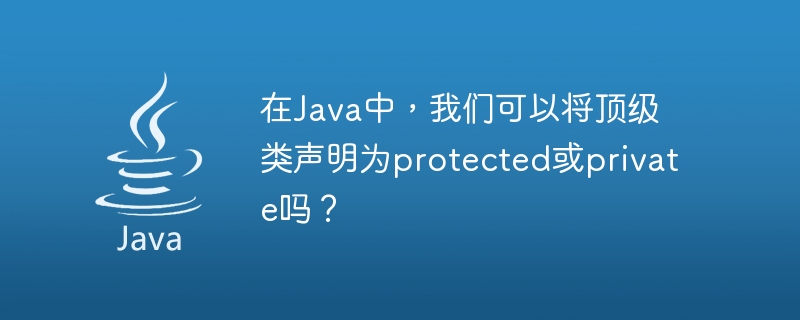在Java中,我們可以將頂級類別聲明為protected或private嗎?

不,我們不能將頂層類別宣告為私有或受保護。它可以是公共或預設(無修飾符)。 如果沒有修飾符,則應該具有預設存取權限。
語法
// A top level class
public class TopLevelClassTest {
// Class body
}將類別宣告為Protected
#範例
即時示範
protected class ProtectedClassTest {
int i = 10;
void show() {
System.out.println("Declare top-level class as protected");
}
}
public class Test {
public static void main(String args[]) {
ProtectedClassTest pc = new ProtectedClassTest();
System.out.println(pc.i);
pc.show();
System.out.println("Main class declaration as public");
}
}在上面的範例中,我們可以將類別宣告為protected,它會拋出一個錯誤,提示修飾符protected不允許在此使用。因此,上面的程式碼不會執行。
輸出
modifier protected not allowed here
將類別宣告為私有
範例
即時示範
private class PrivateClassTest {
int x = 20;
void show() {
System.out.println("Declare top-level class as private");
}
}
public class Test {
public static void main(String args[]) {
PrivateClassTest pc = new PrivateClassTest();
System.out.println(pc.x);
pc.show();
System.out.println("Main class declaration as public");
}
}在上面的範例中,我們可以將類別宣告為private,它會拋出一個錯誤,表示這裡不允許修飾符private 。所以上面的程式碼不會執行。
輸出
modifier private not allowed here
以上是在Java中,我們可以將頂級類別聲明為protected或private嗎?的詳細內容。更多資訊請關注PHP中文網其他相關文章!

熱AI工具

Undresser.AI Undress
人工智慧驅動的應用程序,用於創建逼真的裸體照片

AI Clothes Remover
用於從照片中去除衣服的線上人工智慧工具。

Undress AI Tool
免費脫衣圖片

Clothoff.io
AI脫衣器

AI Hentai Generator
免費產生 AI 無盡。

熱門文章

熱工具

記事本++7.3.1
好用且免費的程式碼編輯器

SublimeText3漢化版
中文版,非常好用

禪工作室 13.0.1
強大的PHP整合開發環境

Dreamweaver CS6
視覺化網頁開發工具

SublimeText3 Mac版
神級程式碼編輯軟體(SublimeText3)

熱門話題
 突破或從Java 8流返回?
Feb 07, 2025 pm 12:09 PM
突破或從Java 8流返回?
Feb 07, 2025 pm 12:09 PM
Java 8引入了Stream API,提供了一種強大且表達力豐富的處理數據集合的方式。然而,使用Stream時,一個常見問題是:如何從forEach操作中中斷或返回? 傳統循環允許提前中斷或返回,但Stream的forEach方法並不直接支持這種方式。本文將解釋原因,並探討在Stream處理系統中實現提前終止的替代方法。 延伸閱讀: Java Stream API改進 理解Stream forEach forEach方法是一個終端操作,它對Stream中的每個元素執行一個操作。它的設計意圖是處
 創造未來:零基礎的 Java 編程
Oct 13, 2024 pm 01:32 PM
創造未來:零基礎的 Java 編程
Oct 13, 2024 pm 01:32 PM
Java是熱門程式語言,適合初學者和經驗豐富的開發者學習。本教學從基礎概念出發,逐步深入解說進階主題。安裝Java開發工具包後,可透過建立簡單的「Hello,World!」程式來實踐程式設計。理解程式碼後,使用命令提示字元編譯並執行程序,控制台上將輸出「Hello,World!」。學習Java開啟了程式設計之旅,隨著掌握程度加深,可創建更複雜的應用程式。












